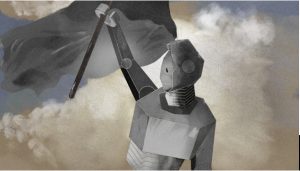A Sure Bet: Unemployment and Homelessness
Is there anything worse than prison? There must be–some people try to get into prison to survive the winter.
On the market, human beings can depreciate like any commodity. The laws of supply and demand apply to labor too: the more workers available, the cheaper employers can get them. An unemployed population serves the dual purpose of keeping wages down and reminding employees to be careful not to wind up on the wrong side of a pink slip. The unemployed suffer the double humiliation of having to beg for humiliating jobs; this confuses everything by making them seem eager to be exploited, when in fact it’s simply the lesser of two evils.
A century ago, champions of technological progress proclaimed that it would liberate human beings from the need to work, creating a new leisure society. But although these new technologies have indeed eliminated jobs, this has largely been used to save employers money, not to provide for the general public. From the perspective of the unemployed, free time and access to resources seem to be concentrated at opposite poles of the economic spectrum. Some leisure society!
Capitalism produces wealth, but it produces far more poverty. There’s no upper limit to how much wealth one individual can amass, but there is a lower limit to how much any one person can be pillaged–so it takes a tremendous number of poor people to produce a few billionaires.
Unemployment is one form of exclusion from the market; homelessness is another, and all the different forms reinforce each other in a feedback loop. In the US, well over a million people are homeless; worldwide, over a billion live in favelas, refugee camps, and worse. We think of shantytowns as the periphery of cities, but in some countries the majority of the population dwells in them. Most of the new arrivals to these shantytowns are not driven by the availability of work but by the destruction of their traditional ways of life. With the need for labor in manufacturing steadily declining, slums function as a holding pool for the unwanted in regions where there’s not enough wealth to support a large service sector. The point is to keep them within reach of sweatshops and processing plants but out of range of the wealthy.
Like the unemployed, the excluded play a role in capitalism simply by implying the consequences of exclusion. But this is not enough–for economic success to be associated with personal merit, it has to appear that exclusion is their fault. Divested of all assets and hope, the poor can be made to look vicious enough. Yet not so long ago, before private ownership, access to resources was evenly distributed among all human beings; if some people and peoples are impoverished now, it is because they–or their ancestors–were looted. One need only open a history book to read about the brutal history of colonialism in the Americas, Africa, India, China–but this process continues today wherever one person’s labor enriches another.
Some people chafe at welfare programs funded by tax dollars: why should someone else get a free ride off their hard work? They ought to ask the same question about politicians and bosses. In fact, every poor person who has ever worked for a wage has helped give the wealthy a free ride. Tax money that goes to welfare is one of the only examples of wealth flowing back down the pyramid to the class that does most of the work to create it. Welfare programs were won by decades of bitter struggle; wherever the powerful do not fear an impending uprising of the poor, they are dismantling them.
That’s not to say that public assistance programs could ever be an effective solution to the ills of capitalism. Welfare programs and charity organizations both tend to foster middle-class bureaucracies while shaming and disempowering the needy. Welfare and charity only redistribute wealth on the terms of the wealthy–that is, as a means of maintaining the unequal balance of power. Welfare programs in particular are interconnected with the same apparatus of control used to repress poor people who get out of line: they use the same databases, impose the same compulsory programs, and treat the poor with the same lack of respect. The only real cure for poverty is for the poor to seize resources back on their own terms.
The tactics available to the excluded tend toward revolt rather than reform. We can’t use violent measures against a stronger, more heavily equipped enemy lest we justify greater violence upon ourselves. We can’t join them in the capitalist game unless we become ourselves the problem. Instead, we turn to the revolutionary Jesus the Christ. This blue collar prophet was wildly popular among the masses. His teachings outline a perfect strategy of non-violent civil disobedience. At the heart was a need to be educated in things of God.
The apostles were very effective in the revolution (read the book of Acts carefully).
Set your hearts on his kingdom first, and on his righteousness, and all these other things will be given you as well (Matthew 6:33)
The Nazarene Journal
Edited and republished by the Nazarene Messianic Party
Let us build on true independence and salvation for the people
You can reach us the (NMP) at 716-885-2289



